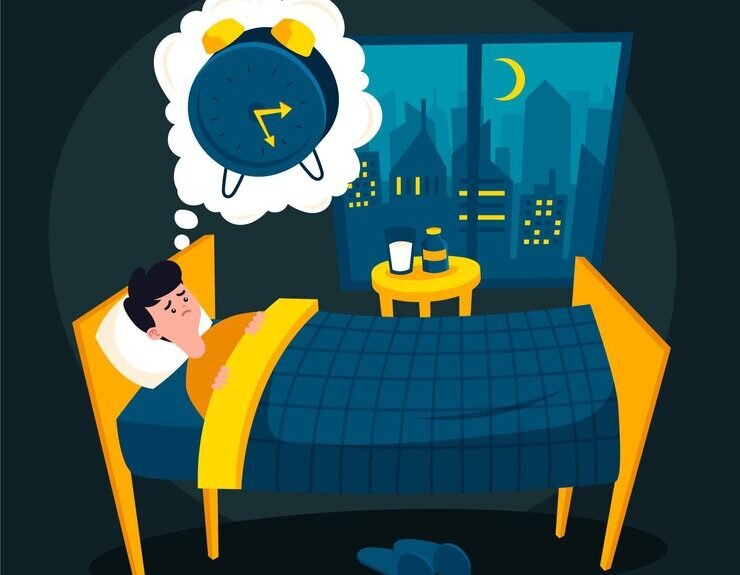Benefits Of Napping Everyday
Finding time to recharge can feel like a luxury. However, napping is a simple yet effective way to boost your energy and mood. Contrary to the stereotype that naps are only for children, many adults incorporate naps into their daily routines, with studies showing that a well-timed nap can enhance cognitive function, improve mood, and even boost productivity. This guide delves into the myriad benefits of napping everyday, how to nap effectively, and tips for creating the ideal napping environment.
The Benefits of Napping
Napping isn’t just a quick escape; it comes with a host of benefits that can improve your overall well-being. Here’s a closer look at what napping everyday can do for you:
1. Increased Alertness

One of the most immediate benefits of a nap is increased alertness. After a short nap, many people report feeling more awake and ready to tackle tasks. Research shows that even a 20-minute nap can enhance alertness, helping you shake off that mid-afternoon slump. This boost in alertness can be especially helpful for shift workers or those with demanding schedules.
2. Enhanced Mood

Napping everyday can also be a mood booster. Studies suggest that short periods of sleep can reduce feelings of stress and anxiety, leading to a more positive outlook. This emotional uplift can be beneficial in high-pressure work environments or during busy days. A nap can serve as a mini-reset, allowing you to approach the rest of your day with renewed enthusiasm.
3. Improved Memory and Learning

Napping plays a crucial role in memory consolidation. When you sleep, your brain processes and organizes information from the day. This can be particularly helpful for students or anyone who needs to retain new information. Research has shown that napping everyday can improve recall and learning, making it a strategic tool for anyone looking to enhance cognitive performance.
4. Better Performance

Whether at work or during daily activities, napping everyday has been linked to improved performance. A quick nap can sharpen your focus, increase your reaction times, and enhance overall cognitive function. This is especially beneficial for those who work in demanding or fast-paced environments, where quick decision-making is essential.
5. Reduced Fatigue

For many, napping everyday can combat fatigue and help maintain energy levels throughout the day. This is particularly useful for individuals who might not get sufficient sleep at night due to work commitments, family responsibilities, or other factors. A well-timed nap can help bridge the gap, making you feel more engaged and productive.
6. Health Benefits

In addition to the psychological and cognitive advantages, napping may also confer several health benefits. Research suggests that napping everyday can lower blood pressure, reduce the risk of heart disease, and even improve immune function. These health benefits make napping not just a nice-to-have but an important aspect of a balanced lifestyle.
How Long Should You Nap?
The effectiveness of a nap often hinges on its duration. Different nap lengths can yield varying benefits, so it’s essential to understand what works best for you:
1. Power Naps (10-20 minutes)
These short naps are often referred to as “power naps” for a reason. Lasting just 10 to 20 minutes, they are perfect for a quick refresh without delving into deeper sleep stages. This duration allows you to wake up feeling alert and energized rather than groggy. Many people find that a power nap can be just what they need to regain focus and energy.
2. Medium Naps (30-45 minutes)
Napping everyday for about 30 minutes can also provide cognitive benefits without the risks associated with longer naps. However, be cautious; waking up during slow-wave sleep can lead to sleep inertia, that groggy feeling that can sometimes accompany longer naps. If you choose this duration, setting an alarm can help you wake up at the right time.
3. Longer Naps (60-90 minutes)
If you have the luxury of time, a longer nap can include deeper sleep stages, allowing for comprehensive restorative benefits. A 60-90 minute nap can enhance creativity and problem-solving skills, but timing is crucial to ensure that it doesn’t interfere with your nighttime sleep. These naps can be particularly useful for those who are recovering from sleep deprivation.
Optimal Timing for Napping

When you nap can be just as important as how long you nap. Here are some guidelines:
- Napping Before 2 PM: Early afternoon is typically the best time for a nap. Your body naturally experiences a dip in energy around this time, making it an ideal moment to recharge. This can also align well with your body’s circadian rhythm.
- Avoiding Late Afternoon Naps: Napping too late in the day, particularly after 3 PM, can disrupt your nighttime sleep cycle, making it harder to fall asleep at your regular bedtime.
Personalizing Your Nap Schedule
Everyone’s schedule and body are different, so it might take some experimentation to find what works best for you. Pay attention to how different nap lengths and timings affect your alertness and sleep quality at night.
Creating the Perfect Nap Environment
To maximize the benefits of napping, it’s important to create a conducive environment. Here are some tips to enhance your napping experience:
1. Choose a Quiet, Dark Place

Find a location where you can minimize noise and distractions. Using blackout curtains or an eye mask can help block out light, making it easier for you to drift off. If you’re napping at work or in a public space, noise-cancelling headphones can also be a great investment.
2. Control the Temperature

The room should be at a comfortable temperature—not too hot or too cold. A cool environment often promotes better sleep. If necessary, keep a light blanket nearby for added comfort.
3. Use Earplugs or White Noise

If you live in a noisy area, consider using earplugs or a white noise machine to drown out distracting sounds that might interrupt your nap. Many people find that white noise can create a calming atmosphere that helps them fall asleep faster.
4. Set an Alarm

Set an alarm for the duration of your intended nap to prevent oversleeping. This helps ensure you wake up feeling refreshed rather than groggy. You might also want to consider using a gentle alarm tone to ease your transition back to wakefulness.
What to Do After Napping
Once you wake up from a nap, give yourself a few moments to adjust. Engaging in light stretching or taking a few deep breaths can help you transition back to your day. Avoid jumping straight into tasks that require intense focus right away; instead, take a moment to gather your thoughts.
Rehydration
After waking, consider drinking a glass of water. Dehydration can contribute to fatigue, so rehydrating can help you feel more alert and ready to go.
A Light Snack
If you’re feeling a bit sluggish after your nap, a light snack may help. Foods rich in protein or healthy fats, such as nuts or yogurt, can provide a quick energy boost without weighing you down.
Potential Drawbacks of Napping

While napping can be beneficial, it isn’t for everyone. Here are some potential downsides to consider:
1. Sleep Inertia
Waking up during deep sleep can lead to sleep inertia, causing feelings of grogginess and disorientation. To minimize this, stick to shorter naps or aim to wake up during lighter sleep stages.
2. Nighttime Sleep Disruption
For individuals who struggle with insomnia or have irregular sleep patterns, napping can interfere with nighttime sleep. If you notice that napping negatively affects your sleep quality at night, you may need to adjust your napping habits.
3. Individual Variability
Some people simply may not feel the need to nap or may find it difficult to sleep during the day. If napping doesn’t work for you, consider focusing on improving the quality of your nighttime sleep instead.
4. Dependency on Naps
Some individuals may find themselves relying too heavily on naps to function, which can signal an underlying issue with nighttime sleep quality. If you find you need long or frequent naps to feel rested, it may be worth exploring your overall sleep hygiene.
Final Thoughts
Napping can be a valuable addition to your daily routine, offering numerous benefits for mental clarity, mood, and overall performance. By understanding how to nap effectively and creating a conducive environment, you can harness its restorative effects while minimizing potential drawbacks. If you find yourself feeling tired during the day, consider
incorporating naps into your schedule while ensuring that your nighttime sleep is optimized for your overall health.
Love what you read? Join our community! Like, share, and follow Wikifomo for more exciting insights. Your support encourages our passion! Thank You.
FAQs About Napping
1. Are naps beneficial for everyone?
Not necessarily. While many people benefit from napping, individuals with certain sleep disorders or those who have difficulty sleeping during the day may find napping less effective.
2. How long should I nap to feel refreshed?
Most experts recommend a nap lasting 10-20 minutes for optimal alertness and energy levels.
3. Can napping interfere with my nighttime sleep?
Napping late in the day or for extended periods may disrupt nighttime sleep, particularly for those with existing sleep issues.
4. What is the best time to take a nap?
The early afternoon, ideally before 2 PM, is considered the best time to nap to minimize disruption to nighttime sleep.
5. What can I do if I wake up feeling groggy?
If you experience sleep inertia, try taking shorter naps or adjusting the timing of your naps. Creating a restful environment can also help improve your napping experience.
6. Is it normal to feel tired after a nap?
Feeling slightly tired after a nap can be common, especially if you woke up during a deeper sleep cycle. Adjusting the duration and timing of your naps can help alleviate this.



